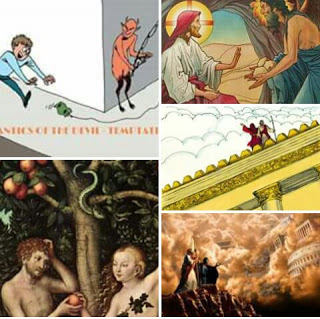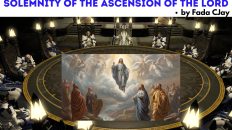Those days at catechism class, I remember vividly that our catechist once defined temptation quite plainly and succinctly: “Temptation is the work of the devil to drag you to Hell!” Indeed, that is quite plain. Of course, he went on to give us more academic definitions, but he didn’t want us to miss the fact that when battling temptation we are in a war, a war with an enemy who wants to destroy us. In many and various ways, we all have experienced temptations at varying degrees…
In this First Sunday of Lent, the Church through the readings presents to us a major obstacle as we journey with Christ in the desert of lent – TEMPTATION. The Church makes us realize that we are bound to experience temptations as we journey with Christ in this penitential period of fasting, prayer, and almsgiving. Hence, since Adam and Eve yielded to temptation by disobeying the Lord’s command – “You shall not eat…” (The law of fasting/abstinence), we, therefore, should find fasting during lent, a very effective instrument to restore our friendship with God, and our obedience to his commands.
Personally, I find Christ’s temptation very interesting. What was the context of the temptation? The Gospel according to Matthew presents to us an odd story. John the Baptist has just baptized Jesus. God has just spoken from heaven, saying, “This is my beloved Son, with whom I am well pleased.” We would expect that the next item on the agenda would be the beginning of Jesus’ ministry. Instead, we read that the Spirit of God led Jesus into the wilderness to be tempted by the devil. That’s strange! Why was Jesus subjected to testing in the wilderness by the devil immediately following His baptism and immediately prior to the beginning of His ministry and the calling of His disciples? The passage commences, thus: “At that time Jesus was led by the Spirit into the desert to be tempted by the devil…” (Mt. 4:1-11). Here, the New Jerusalem Bible (study edition) identifies the Spirit as the “breath – the creating energy of God”. Similarly, in the First Reading (Gn. 2:7-9; 3:1-7), the Lord God formed man out of the clay of the ground and blew into his nostrils the “breath of life” (creative energy of God), and so man became a living being. Consequently, man was placed in the Garden of Eden…and was later tempted by the devil. This demonstrates that while possessing the Spirit of God, we cannot escape temptation; rather we shall be put to test in order that we might prove our love for God. All we need is to cooperate with God’s grace in order to overcome temptations.
It was necessary that Jesus should be put to the test by the devil immediately following His baptism and immediately prior to the beginning of His ministry in order to become our leader (see Heb. 2:10, 17-18; 4:15; 5:2,7-9). Matthew tells us that Jesus had been fasting for forty days and forty nights, and was hungry. There is no reason to doubt that it was forty days and forty nights as the text says; but “forty” is a common number in the Bible for a period of difficulty, hardship, or suffering. One thinks immediately of the Israelites’ wandering for forty years in the wilderness – one whole generation. Forty days was a good long time to be fasting; and that duration is here underscored with the symbolic meaning that it was forty days, the number of duration and testing.
Dear friends in Christ, as we journey through this Lenten period of forty days, the Church calls us to be conscious of temptations – the desires of the flesh. Both Adam and Jesus were tempted to satisfy the desires of the flesh rather than obeying the Word of God. What was the context of Christ’s temptation? The devil, knowing that Christ was hungry, tells Him, if you’re the Son of God, command these stones to become loaves of bread. In other words, the devil tells Jesus: “Look, you are divine! Why should you be hungry? Just change some stones to bread.” Now, we have to ask what was wrong with that. Was there anything wrong with making something to eat? After all, Jesus has the power to do it. However, Jesus had in mind his mission in the wilderness – fasting; that was a spiritual exercise that had a very important place in His life at that moment. But the devil wanted to ruin the mission of Jesus, and so if he could convince Jesus on this seemingly trivial thing to abandon a spiritual work, then he would have had him. The devil simply chose a little thing for the test – food; just as he succeeded in destroying the happiness of Adam and Eve in the Garden of Eden. However, he didn’t succeed in the face of Christ. Christ simply reminded him of the scripture: “Man does not live by bread alone, but on every word that comes forth from the mouth of God”. The devil was amazed, and he felt like, very well, you have shown your trust in God in response to my first appeal; so now prove this trust in God by flinging yourself from the pinnacle of the temple (this, no doubt, was to be in full view of all the assembled people); he even quoted psalm 91:11,12, that God will give the angels charge over him so that he will not dash his foot against a stone…By this, the people would witness that God was with Jesus in a very special way. Jesus responds to him equally in a scriptural manner: “Again it is written, you shall not put the Lord, your God, to the test” (Dt. 6:16). Christ said that because the devil wanted Him to test God. The moment an individual puts God to the test, that person gives evidence that he or she does not really trust God. Hence, Jesus happens to be saying, “No, my trust is perfect; I do not need to do anything heroic to prove it. And I will not test God’s word by doing something foolish – at your prompting.” The last temptation is amazing in its boldness. It is almost as if the devil realized he was not winning, and so with nothing to lose calls for Jesus to worship him. He took Jesus to a high mountain and showed him all the kingdoms of the earth. This verse seems to suggest something mystical, something supernatural. In reality, there is no mountain in Israel high enough to see much of anything. However, as my biblical professor puts it, the idea is probably that the devil provided some vision of these kingdoms. And the promise was that he would give them to Jesus if only Jesus would fall down and worship him. Luke adds that Satan claimed he had been given these kingdoms and it was his right to give them to whomever he wished. Satan was saying to Jesus, “Look, you came as the king to inherit the nations. Here they are. Why go through the trouble of being the suffering servant to get to the crown. Give me one moment’s homage and I will abdicate.” Well, even in the words of Satan there were some clues that this was a malicious temptation. First, the offer was coming from the one who is the prince of liars. Who would knowingly do a deal with the devil? Did Satan actually imagine for one moment that the Son of God would believe him? Never would Satan have given him the kingdoms; that was simply the bait for him to bow before the evil one. Unfortunately, far too many people have believed the evil tempter. Adam and Eve surely did. So Jesus’ response was, “Away from me Satan! For it is written: ‘Worship the LORD your God, and serve Him only.’” This too comes from Deuteronomy (6:13).
Therefore, we are called to learn from Christ, our model in resisting temptation as we fast and pray in this Lenten wilderness. The desires of the flesh should not lure us into ruining our Lenten exercise and penance. We need the overflowing grace of God and the gracious gift of Christ to resist the antics of the devil. As St. Paul puts it in his letter to the Romans (5:12-19). A portion reads: “For if by the transgression of the one, the many died, how much more did the grace of God and the gracious gift of the one man Jesus Christ overflow for the many…how much more will those who receive the abundance of grace and of the gift of justification come to reign in life through the one Jesus Christ”. Let us rely on the grace of Christ, for his grace has won “the broken vow”, the “frequent fall”.
As the Spirit aided Christ in the wilderness, we pray that God would support us with His Spirit in our Lenten wilderness. Let us pray like the psalmist of the psalmist of the day: “A clean heart create for me, O God, put a steadfast spirit within me. Do not cast me away from your presence, nor deprive me of your HOLY SPIRIT”.
Shalom!
Happy Sunday…




